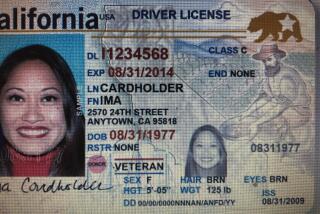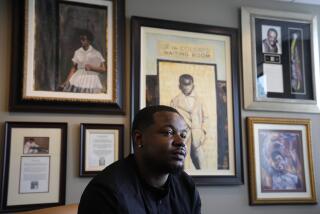Card-Carrying Americans: PRIVACY, SECURITY AND THE NATIONAL ID CARD DEBATEby Joseph W. Eaton (Rowman & Littlefield: $35; 240 pp.)
You apply for a new job. Your prospective employer asks for your new “machine-readable, tamper-resistant, national ID card” with a “biometric indicator” (digitally analyzable retinal eye pattern, fingerprint or signature).
He pops it into an electronic reader that links him to a gigantic mainframe computer maintained by the U.S. Government but partly paid for by private companies seeking its data.
Are you an illegal alien? The computer automatically checks with Immigration and Naturalization’s computer. Are you a wanted criminal or parole violator? Do you have an arrest record? The computer quickly sweeps the FBI’s data base.
Owe back taxes? In default on federal farm or student loans? Delinquent on alimony or child support? Failed to register for the draft at 18? Filed workman’s compensation claims against prior employers? (Some employers blackball frequent claimants.) Your ID card electronically unlocks this data from other computers around the country.
Medical or psychiatric problems? Medical deductions on your tax returns are checked. Drinking problems? Credit card purchases at liquor stores are checked. Sexual problems? Subscriptions to sex magazines, adult video rentals, lingerie purchases in sizes other than your wife’s, phone calls to unmarried women, out-of-town motel reservations--all these can also be checked.
Who wants such a system? Virtually no one, it would seem. The United States has consistently rejected computerized national ID cards, as have Germany, France and Great Britain. An electronic ID card with its vast potential for computerized invasions of privacy, would seem to exceed even George Orwell’s bleak vision of humanity’s future.
But author Joseph Eaton struggles valiantly against all odds to argue that the United States should adopt a national ID card system. “On a de facto basis,” he points out, “the United States already has a national ID system”--consisting of a person’s Social Security Number, driver’s license and credit cards (the average American carries 7.2).
Federal agencies currently use existing identifiers, for example, to access other data bases. The Selective Service already examines state driver’s license data to uncover males over 18 who have failed to register for the draft. The IRS hopes to check the names of delinquent federal borrowers against tax returns. Over 2.8 billion federal records (about 18 files per person)--plus additional State and private records--are technologically accessible at the flick of a switch.
But Eaton believes the system is fragmented and subject to error. A national ID card would guarantee everyone quick and accurate identification; curtail credit card abuses, tax fraud and welfare cheats (thus paying the costs of the entire system); solve immigration problems (only citizens and aliens with ID’s would get jobs); reduce crime (no one could sell a hazardous substance without an ID); allow the national census to be updated daily; and reduce airline terrorism, smuggling and drug importation.
Eaton’s most interesting argument is that a national ID card would actually protect citizens’ liberties and privacy. Laws would prohibit access to religious or political views, social habits and other personal information. Anyone violating these prohibitions would leave identifying “fingerprints”--their own ID access codes. Citizens could continually monitor and update the accuracy of their own files through 24-hour-a-day terminals installed around the country. The post office could cut off citizens’ mail if they moved and failed to update their addresses within two months.
But Eaton blinds himself to the virtually limitless capacity of such a system for error. Some estimate that 50% of current FBI records are inaccurate or incomplete, that only 13% of federal agencies audit their own systems, and that state criminal records are only 12%-to-49% accurate. Pity the poor citizen caught in a web of computer errors generating false arrests, lost jobs or damaged credit ratings. (Ironically, Eaton admits that a “clerical error” cancelled his own ID code, and his university’s computer refused to print out a final draft of his book.)
Eaton pooh-poohs the warnings of “civil liberty maximalists” and romanticizes the “efficiency” of a national ID system. Yet Eaton does little to dispel the fear that error, fraud, tampering and deliberate abuse could trigger rampant invasions of liberty and privacy under a national ID system.
Millions of refugees came to this land to seek “new identities.” Many Americans still harbor the fantasy that citizens have the right to pull up stakes and move, change their identities or even disappear--unrealistic as this may be in the computer age. Eaton’s approach would destroy this cherished dream.
Eaton’s book raises important questions but misses critical answers. It is poorly organized, repetitious, stylistically clumsy and lacks hard data at critical points. Some of his arguments are just silly--that an ID would “handicap smugglers and terrorists” (as though cocaine importers and airline hijackers would be stymied by a new piece of plastic).
The real issue is how to block further computerized encroachments on individual privacy without a national ID card system. The interested reader is better advised to study the recent report of Congress’ Office of Technology Assessment on electronic record systems and individual privacy, a superior introduction to this important subject.
More to Read
Sign up for Essential California
The most important California stories and recommendations in your inbox every morning.
You may occasionally receive promotional content from the Los Angeles Times.










